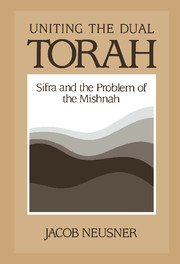Book contents
- Frontmatter
- Contents
- Preface
- Prologue
- 1 The Problem of the Mishnah
- 2 Torah as a Common Noun: The Solution of the Talmuds
- 3 A Sample of Sifra
- 4 From Common Noun to Proper Noun: Sifra's Re-presentation of the Two Torahs as One
- 5 Sifra's Alternative to the Mishnah's Topical Program and Its Order
- 6 Sifra's Alternative to the Mishnah's Logic of Cogent Discourse
- 7 Sifra's Alternative to the Mishnah's Proof of Propositions through Taxonomic Classification and Hierarchization
- 8 Re-presenting the Torah: Sifra's Rehabilitation of Taxonomic Logic
- 9 Torah as Proper Noun and the Structure of the Logic of Creation
- Appendix: The Distinctive Character of Sifra among Midrash Compilations
- Bibliography
- Index
8 - Re-presenting the Torah: Sifra's Rehabilitation of Taxonomic Logic
Published online by Cambridge University Press: 06 July 2010
- Frontmatter
- Contents
- Preface
- Prologue
- 1 The Problem of the Mishnah
- 2 Torah as a Common Noun: The Solution of the Talmuds
- 3 A Sample of Sifra
- 4 From Common Noun to Proper Noun: Sifra's Re-presentation of the Two Torahs as One
- 5 Sifra's Alternative to the Mishnah's Topical Program and Its Order
- 6 Sifra's Alternative to the Mishnah's Logic of Cogent Discourse
- 7 Sifra's Alternative to the Mishnah's Proof of Propositions through Taxonomic Classification and Hierarchization
- 8 Re-presenting the Torah: Sifra's Rehabilitation of Taxonomic Logic
- 9 Torah as Proper Noun and the Structure of the Logic of Creation
- Appendix: The Distinctive Character of Sifra among Midrash Compilations
- Bibliography
- Index
Summary
How Sifra Affirms Taxonomic Logic
We turn directly to the positive side to my argument. First, we will observe a sequence of cases in which Sifra's authorship demonstrates that Listenwissenschaft is a self-evidently valid mode of demonstrating the truth of propositions. Second, we will note, in the same cases, that the source of the correct classification of things is Scripture and only Scripture. Without Scripture's intervention into the taxonomy of the world, we should have no knowledge at all of which things fall into which classifications and, therefore, are governed by which rules. Let us begin with a sustained example of the right way of doing things. Appropriately, the opening composition of Sifra shows us the contrast between relying on Scripture's classification, and the traits imputed by Scripture to the taxa it identifies, and appealing to categories not defined and endowed with indicative traits by Scripture.
Parashat Vayyiqra Dibura Denedabah Parashah 1
I:I.1. A. “The Lord called [to Moses] and spoke [to him from the tent of meeting, saying, ‘Speak to the Israelite people and say to them’]” (Lev. 1:1):
B. He gave priority to the calling over the speaking.
C. That is in line with the usage of Scripture.
D. Here there is an act of speaking, and in connection with the encounter at the bush [Ex. 3:4: “God called to him out of the bush, ‘Moses, Moses’”], there is an act of speaking.
[…]
- Type
- Chapter
- Information
- Uniting the Dual TorahSifra and the Problem of the Mishnah, pp. 157 - 181Publisher: Cambridge University PressPrint publication year: 1990



